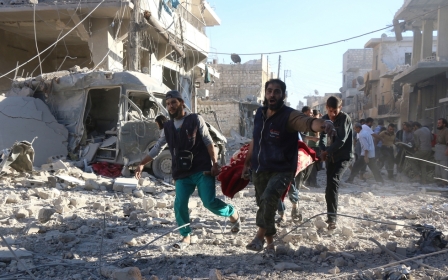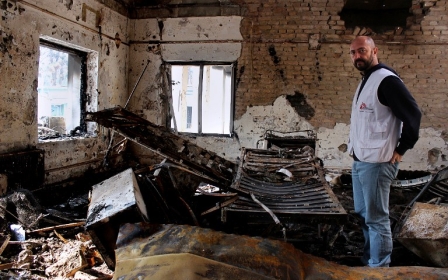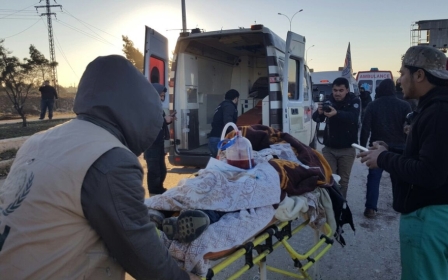UN accuses Syrian government of 'egregious' war crimes in Aleppo

The Syrian government has committed multiple war crimes, including the bombing of an aid convoy, killing hundreds of civilians, reducing hospitals to rubble and launching chlorine gas attacks in the battle for Aleppo, a hard-hitting UN report has said.
Rebels were also blamed for indiscriminate bombing of civilians in government-controlled western areas to intentionally terrorise, and using others as human shields.
But the report, by the UN's independent international commission of inquiry into Syria, laid out a roll call of war crimes it said it "strongly" suspected were committed by government forces as they sought to re-occupy the east of the city between July and December 2016.
The inquiry said it could not find conclusive evidence that Russia, the Syrian government's ally, was involved in violations of international law.
In its report summary, the inquiry said: "The battle for control over Aleppo city was a stage of unrelenting violence, with civilians on both sides falling victim to war crimes committed by all parties.
"As part of a strategy to force surrender, pro-Government forces encircled eastern Aleppo city in late July and trapped civilians without adequate food or medical supplies.
"Between July and December 2016, Syrian and Russian forces carried out daily air strikes, claiming hundreds of lives and reducing hospitals, schools and markets to rubble.
"Syrian forces also used chlorine bombs in residential areas, resulting in hundreds of civilian casualties."
'Egregious attack'
The report blamed the Syrian air forces for the "egregious attack" on a UN-Red Crescent humanitarian convoy on 19 September in Orum al-Kubra - during a supposed ceasefire - which killed 14 aid workers and destroyed 17 trucks containing "food, medicine, children’s clothes and other supplies" destined for civilians in rebel-held areas.
"The convoy had been authorised by the government, which was aware of its location at the time of the attack," said the report. "The types of munitions used, the breadth of the area targeted and the duration of the attack strongly suggest that the attack was meticulously planned and ruthlessly carried out by the Syrian air force."
Syria's government and its Russian allies have denied all charges against them, blaming rebels for the attack on the convoy and saying all military action was against "terrorists" hiding behind people being used as human shields.
Russia released what it said was proof that rebels had bombed the convoy - including drone footage that Moscow claimed showed rebels with heavy weapons were riding with the convoy at the time it was attacked.
In none of the incidents investigated were military targets identified as being present in the vicinity of a hospital
The inquiry said Syrian forces deliberately targeted medical facilities in eastern Aleppo with "repeated bombardments".
"In none of the incidents investigated by the commission were military targets identified as being present in or around the vicinity of a hospital, nor were warnings given prior to any given attack as required by international humanitarian law."
"The lack of warnings and the absence of military presence in the vicinity of the healthcare facilities strongly suggest the deliberate and systematic targeting of medical infrastructure as part of a strategy to compel surrender."
The report focused on the M10 hospital, in al-Sakhour district, which it said was hit four times between late September and mid-October, putting it completely out of service.
The Atlantic Council and researchers from Goldsmiths University are reconstructing the destruction of M10, after releasing a report and reconstruction about its sister hospital M2 which was "completely destroyed" in repeated air attacks.
The researchers used CCTV footage from inside M2 to piece together the effects of the attacks.
Cluster munitions were "pervasively used" in densely-populated areas, the report said said, amounting to the war crime of indiscriminate attacks.
The inquiry said that a deal struck to evacuate civilians from east Aleppo following the rebel defeat in December was a "crime of forced displacement".
Those evacuations, which were observed by UN staff and the International Committee of the Red Cross, left civilians with "no option to remain", the inquiry said.
"Such agreements amount to the war crime of forced displacement of the civilian population... for strategic reasons – and not for the security of civilians".
Rebel war crimes
The UN report also said rebels had "persistently" shelled civilians in western Aleppo.
"Using improvised weapons, these groups often fired indiscriminately in attacks that killed and injured dozens, including women and children.
"When launched without a clear military target, these attacks intentionally terrorised the civilian population," the report went on.
"Some armed groups also committed war crimes of withholding the distribution of humanitarian aid from the besieged population under their control, and actively denied civilian freedom of movement, used civilians as human shields, conducted arbitrary arrests and used civilian buildings for military purposes.
"As the situation deteriorated in eastern Aleppo and people tried desperately to flee, some armed groups violently prevented them and used them as human shields.
When launched without a clear military target, these attacks intentionally terrorised the civilian population
The UN report also said Syrian government forces executed presumed rebel fighters and their supporters as they rolled through eastern Aleppo in December.
"Hundreds of men and boys were separated from their families and forcibly conscripted by the Syrian army. The fate of others remains unknown."
The commission called on all sides to comply with their obligations under international human rights and international humanitarian law.
It said the Syrian government must carry out "investigations into the conduct of their forces and make their findings public," and that rebels must "repudiate extreme elements and apply effective leverage for compliance with international law".
The commission called on world powers to establish "an international, impartial and independent mechanism to assist in the investigation and prosecution of persons responsible" for the most serious crimes committed in Syria since the start of the 2011 revolution.
The report, released as Syrian peace talks continue in Geneva, covers the July-December period and is based on 291 interviews with victims and witnesses, as well as analysis of forensic evidence and satellite imagery.
New MEE newsletter: Jerusalem Dispatch
Sign up to get the latest insights and analysis on Israel-Palestine, alongside Turkey Unpacked and other MEE newsletters
Middle East Eye delivers independent and unrivalled coverage and analysis of the Middle East, North Africa and beyond. To learn more about republishing this content and the associated fees, please fill out this form. More about MEE can be found here.




